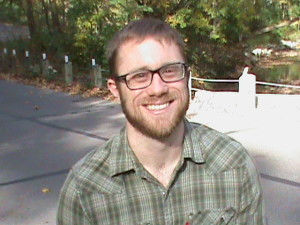If I had my babies I would lay them in a crib
They would glitter like diamonds
My legs would splash through surf
sending droplets of pacific gism
to sparkle in the sun
When they fall on me
I am pregnant again
I am whole
I am invulnerable
to murderers and rapers
I am the Virgin Mary
protected by God
But there are so many Virgin Marys
bloody Marys
cross-eyed Marys
marys whose eyes are carbolic wedges of cheese
leprosy marys
revolving door marys
marys who work at convenience stores
marys whose lives are inconvenient
marys who died tens of thousands of years ago
and whose voices are reaching us
only now
marys on their backs in cheap motels
marys who were my roommates in the asylum
So many
I am hitch-hiking to my babies
I will arrive soon
Mitchell Krockmalnik Grabois has had over twelve-hundred of his poems and fictions appear in literary magazines in the U.S. and abroad, including POETRY LIFE AND TIMES. He has been nominated for numerous prizes. His novel, Two-Headed Dog, based on his work as a clinical psychologist in a state hospital, is available for Kindle and Nook, or as a Print Edition . To see more of his work, google Mitchell Krockmalnik Grabois. He lives in Denver.
Robin Ouzman Hislop is Editor of Poetry Life and Times his publications include All the Babble of the Souk and Cartoon Molecules collected poems and Key of Mist the recently published Tesserae translations from Spanish poets Guadalupe Grande and Carmen Crespo visit Aquillrelle.com/Author Robin Ouzman Hislop about author. See Robin performing his work Performance (Leeds University) .
poetry
Tricks language plays. A Poem by Rajnish Mishra
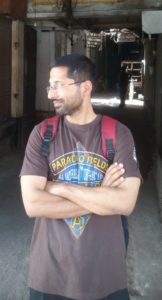
My daughter, eight, looked at me
with eyes: half-enquiring, half-afraid,
eyes with faith, half, at least,
and asked suddenly: Are we born again after death?
I looked at my wife. Our eyes met.
She smiled: that corners of the eyes,
so-it-did-happen smile, and I knew
it was not she who dropped
a hint to the child
of death or birth, or both.
I did not, I know. We don’t discuss death
at home, especially with children
awake or around: never with them around.
No, not death, the old enemy, no talks
in the recent past with anyone.
Death horrifies me.
So, I sat back,
took a pause,
filled my eyes with light and strength,
that fills the eyes of those
with half-faith, at least,
and told her boldly that half-lie:
‘No, you don’t have to die if you say no to death’.
I knew I was half-true.
Tricks language plays!
Rajnish Mishra is a poet, writer, translator and blogger born and brought up in Varanasi, India. He is the editor of PPP Ezine, a poetry ezine. He has a blog on poetry, poetics and aesthetic pleasure: https:/poetrypoeticspleasure.wordpress.com.
Robin Ouzman Hislop is Editor of Poetry Life and Times his publications include All the Babble of the Souk and Cartoon Molecules collected poems and Key of Mist the recently published Tesserae translations from Spanish poets Guadalupe Grande and Carmen Crespo visit Aquillrelle.com/Author Robin Ouzman Hislop about author. See Robin performing his work Performance (Leeds University) .
“No Home To Speak Of” A Poem by James Dennis Casey 1V.
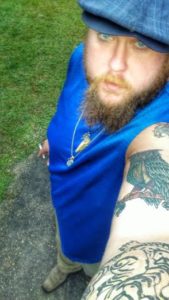
 Bus fare destinations
Bus fare destinations
Falling short
All these haunts of
Clockwork Orange
Dreams
Living behind
Courteous lies
That subdue the imagination
Waking up
A whole new
Creature
No home to speak of
Wearing travelers boots
And coins on eyelids
Fighting and fucking
My way through life
With no direction
Or destination
Blood made of whiskey
Lungs made of ash
There’s plenty to go around
When you live
In a dirty ditch
Feeling like nobody
Wanting to be somebody
©James Dennis Casey IV
James D. Casey IV is a self published author of three volumes of poetry: Metaphorically Esoteric, Dark Days Inside the Light While Drunk on Wine, and Tin Foil Hats & Hadacol Coins. His work has been featured in print and online both nationally and internationally by several literary venues including Triadæ Magazine, Poetry Life & Times, Pink Litter, In Between Hangovers, Indiana Voice Journal, Beatnik Cowboy, Dissident Voice, Scarlet Leaf Review, Horror Sleaze Trash, Zombie Logic Review, Your One Phone Call, I am not a Silent Poet, Tuck Magazine, and Outlaw Poetry to name a handful. Links to his books, social network profiles, and other projects can be found on his website: http://louisianakingcasey.wixs ite.com/big-skull-poetry
Rev.James Dennis Casey IV Ordained Dudeist Priest at Dudeism, the Church of the Latter-Day Dude
Robin Ouzman Hislop is Editor of Poetry Life and Times his publications include All the Babble of the Souk and Cartoon Molecules collected poems and Key of Mist the recently published Tesserae translations from Spanish poets Guadalupe Grande and Carmen Crespo visit Aquillrelle.com/Author Robin Ouzman Hislop about author. See Robin performing his work Performance (Leeds University) .
Sur Mama and other Poems by Luz Pichel Translated from Castellano and Gallego
Editor’s Note: although we include the originals in this text, to introduce the poems of Luz Pichel, she is a Galician poet, a region in Spain with its own language (Gallego) which although bears similarities to Spanish (Castellano) is strikingly different. Luz Pichel mixes both languages in her work, but we as translators, have translated both into English, (apart from the little French ditty On The Bridge of Avignon in the first poem) hence the footnotes will often indicate the original Gallego scripts in the texts.
(1.)
the south mama maría
i did not take you to the south nor to the southern station so you could see floor 0
floor 1 floor 2 the general view 1 prices maps tickets tours
southern pages news the such a pretty cross
I have to go one summer with you to the heavens to see the southern
cross mama
the south in all the languages of the world your name
mother in all the stars in all
the ways of milk
in our lovely rude tongue mother 2
south in french listen well sur la table 3
a girl opened on the sacrificial table 4
sur le pont d’avignon
l’on y danse l’on y danse
sur-face
what do they make?
who makes the south?
who builds the south?
who profits from the south?
who profits? 5
les beaux messieurs font comme ça
et puis encore comme ça
(bang bang bang
a piggy gesture)
sur le sable 6 the cobra of fear crawled
on the sand he left engraved his SS
the general view mama these will be the plots of memory
l’on y dance tous en rond
les militaires font comme ça
(bang, bang bang
a homicide a child)
et puis comme ça
les beaux messieurs e les militaires
the building of the south mama patricia mare mâe 7
our south their south les belles dames
les belles dames dansent
elles font comme ça
et puis encore comme ça
the south mama eva mamá álvaro rafa guadalupe francisca
rosalía alfonsina federico emily luis
chámase mamá manuel
mamá manuela/
where your migrant shins grew
skinny on the sacrificial table 8
one day we will go all together there to the south mamai
they still have to see us dance on the cobra’s SS
e puis encore 9 dance
we’re all going to be prima ballerinas mama
noelina
the musicians will do like this like this like this
and still again if it is the case like this another time / comme ça 10
**
vista xeral 1
na nosa lingua ruin bonita nai 2
on the table 3
sobre da mesa do sacrificio abríase a rapaza aquela 4
que fan?
quen fai o sur?
quen constrúe o sur? quen aproveita o sur?
quen se aproveita? 5
on the sand 6
mother mama 7
onde medraron as túas canelas migratorias
fracas na tabla do sacrificio 8
and then again 9
e os músicos farán así e así e así
e despois aínda si es caso outra vez así/ comme ça 10
(1.)
el sur mamá maría
al sur no te he llevado ni a la estación del sur para que vieras planta 0
planta 1 planta 2 vista xeral los precios los mapas los tickets los recorridos las
páginas del sur las noticias la cruz tan guapa
he de ir un verano contigo al cielo a ver la cruz del sur mam
el sur en todas las linguas do mundo tu nombre
de madre en todas las estrellas en todas
las vias de la leche para que veas
na nosa lingua ruín bonita nai
sur en francés escucha bien sur la table
sobre da mesa do sacrificio abríase a rapaza aquela
sur le pont d’avignon
l’on y danse l’on y danse
sur–face
que fan?
quen fai o sur?
quen constrúe o sur? quen aproveita o sur?
quen se aproveita?
les beaux messieurs font comme ça
et puis encore comme ça
(bang bang bang
un gesto guarro)
sur le sable se arrastraba la cobra del miedo
sobre la arena dejaba grabadas sus eses
vista general mama estas serán las eras de la memoria
l’on y dance tous en rond
les militaires font comme ça
(bang, bang bang
un homicidio un niño)
et puis comme ça
les beaux messieurs e les militaires
construcción del sur mamá patricia mare mâe
el nuestro el de ellas les belles dames
les belles dames dansent
elles font comme ça
et puis encore comme ça
o sur mamá eva mamá álvaro rafa guadalupe francisca
rosalía alfonsina federico emily luis
chámase mamá manuel
mamá manuela/
onde medraron as túas canelas migratorias
fracas na tabla do sacrificio
un día vamos a ir todas juntas allá hasta el sur mamai para que sepas
aún nos han de ver danzar sobre la ese de la cobra e puis encore danzar
vamos a ser todas unas bailarinas de primera mamá noelina
e os músicos farán así e así e así
e despois aínda si es caso outra vez así/ comme ça
(2.)
I give you a herb
you said
inside a letter
take this leaf grandma I found it
it has dust
her name is luz 1
a tiny green thread an oval drawing
and the moon rolling down a rock
smell of orange blossom
this is called orange he said it is something to eat
I bought it at the cattle fair for you
a chick being hatched is not easy either
if there is no ear of wheat
if there is no waiting
if there is no space
some when they are hatched their roost is spoiled
they go
luz but the leaf has nerves covered
in dust but
do not then get confused but blow
the woman picked up an ear of wheat from the ground
an ear of wheat has little flour but
it will make sense
orange falls the moment you passed by
it rolls smells
I wanted to make a simple thing to give you
to give them
to give you
to make an old age
a death even
a thing like the spiral peel of an orange
unspoiled
(unlike the pedros´ baby girl
who came badly)
sometimes the peel is torn
take luz an orange look I found it in the air
and luz is not luz either
neither is a leaf that falls
– hayu hayuná hayunaí there! (someone celebrates something)
a woman on the door step gazes out
to far far away
her name was orange she peeled well she came out unspoiled
she had been learning simply to fall
in a spiral on herself
1. Light.
(2.)
te regalo una hierba
dijiste
dentro de una carta
toma esta hoja abuela la encontré
tiene polvo
se llama luz
un hilito verde un dibujo ovalado
y la luna rodando por una roca
olor a azahar
esto se llama naranja dijo es cosa de comer
en la feria la compré para ti
un pollito naciendo tampoco es fácil
si no hay espiga
si no hay espera
si no hay espacio
algunos cuando nacen se les rompe la casa
se van
luz pero la hoja tiene los nervios cubiertos
de polvo entonces
pero no confundirse pero soplar
la mujer recogía del suelo una espiga de trigo
una espiga de trigo poquita harina tiene pero
tendrá sentido
naranja cae en el momento en que tú pasabas por allí
rueda huele
yo quería hacer una cosa sencilla para darte
para darles
paro daros
hacer una vejez
una muerte incluso
una cosa así como la piel en espiral de una naranja
cuando se logra entera
(la niña de los de pedro no se logró tampoco
venía mal)
a veces se desgarra la piel
toma luz una naranja mira la encontré en el aire
y luz tampoco es luz
tampoco es una hoja que cae
— ¡hayú hayuná hayunaí allá! (alguien celebra algo)
una mujer en el umbral se asoma al otro lado
mira desde muy muy lejos
se llamaba naranja pelaba bien salía entera
había ido aprendiendo a caer sencillamente
en espiral sobre sí misma
(3.)
Babe take flowers to Chekhov´s grave
take a little branch
if you go to russia one day do that
you go and take flowers but there
when you grow up
a seagull at a beach give her flight
so when you go to russia you ask
do you know where´s Chekhov´s grave
it must have a painted sea bird
he went cold
she was the apple of his eye
she closed his eyes
wide open like
portals of a house without people
like a hot cross bun she crossed his eyelids
and she said to herself said told herself
I´ll go dad I´ll go leave
in peace
I ´ll go
even if it rains
then the little one put four
slices
of bread inside a bag
a small bottle of water only four of bread only
´cos it would get hard inside a bag
she started walking into the hill
without anyone seeing her
´cos it was not proper to wait to grow up
to go and put some flowers over a
grave in russia
(3.)
nena llévale flores a la tumba de chejov
llévale un ramito
si vas a rusia un día tú lo haces
vas y le llevas flores pero allá
cuando seas grande
una gaviota en una playa échala a volar
después vas a rusia preguntas
usted sabrá dónde la tumba de chejov
debe de tener pintado un pájaro marino
se quedó
ella era la niña de los ojos de él
le cerró los ojos
que los tenía así
portales de una casa sin gente
le hizo la cruz del pan sobre los párpados
y se dijo a sí misma dijo dijo para sí
he de ir papá he de ir marcha tranquilo
he de ir
aunque llueva
entonces la pequeña cuatro rebanadas
de pan en una bolsa
botellita de agua sólo cuatro de pan sólo
que se iba a poner duro en una bolsa
echó a andar monte adentro
sin que la viera nadie
pues no era del caso esperar a ser grande
para ir a poner unas flores encima de una
tumba en rusia
(4.)
harriet tubman was born araminta ross
maria was born agnieszka
norma was born conchita
fernán was born cecilia
pocahontas was born matoaka
álvaro was born álvar
raphaël was born rafita
hypatia of alexandria was born a martyr
annika was born anita
rachael was born raquel
andrzej naceu 1 andrés
christine was born george
carla was born carlos
lucas naceu lilia
mary shelley was born mary godwin
dolly naceu dolly non saíu / she never left
the roslin institute
1. was born
(4.)
harriet tubman nació araminta ross
maría nació agnieszka
norma nació conchita
fernán nació cecilia
pocahontas nació matoaka
álvaro nació álvar
raphaël nació rafita
hypatia de alejandría nació mártir
annika nació anita
rachael nació raquel
andrzej naceu andrés
christine was born george
carla nació carlos
lucas naceu lilia
mary shelley nació mary godwin
dolly naceu dolly non saíu / no salió nunca
del roslin institute
(5.)
harriet tubman rests her head lays it
on the train track and sleeps she leads ahead because she knows languages understands the signs bears the beatings knows the underground rail ways and sees what cannot be seen and dreams what cannot be dreamt next to harriet all the others sleep over the track non return trips are long forests are very scary bugs and smugglers are very scary some countries are far too far they are so far away some mornings never reach a train station never never arrive they pass by in the darkness things look like bundles the ones who move carrying linen bags or with a little old lady on their shoulders they look like wolves mist on her palm a woman has written a verse in orange ink the train track is not a cosy pillow the cold doesn´t let you keep your ideas safe sleep and dream the message read the deeper the dream the farther it takes you little foreigner
(5.)
descansa a cabeza harriet tubman póusaa
na vía do tren e dorme ela vai por diante porque sabe linguas entende os letreiros aguanta os paus / los palos coñece os camiños de ferro sub da terra e ve o que non se ve e soña o que non se soña a caronciño / a la vera de harriet as outras dormen todas sobre da vía as viaxes sen retorno fanse largas as fragas / bosques meten moito medo meten medo os bichos e os estraperlistas algúns países están lonxe de máis / quedan tan tan lejos algunhas mañás / mañanas non chegan nunca á estación dun tren / no llegan nunca nunca pasan na escuridade as cousas semellan vultos os que se moven cargando con sacos de liño / lino ou cunha velliña ao lombo / una viejecita sobre los hombros semellan lobos néboa / niebla na man aberta ten escrito a muller un verso con tinta de cor laranxa a vía do tren non é unha almofada xeitosa / una almohada agradable no es la vía de un tren o frío non permite acomodar as ideas sen perigo / peligro durme e soña dicía a mensaxe o soño canto máis fondo máis lonxe te leva / más lejos te transporta extranxeiriña
Translations Amparo Arróspide & Robin Ouzman Hislop
Bio Photo. Luz Pichel & Amparo Arróspide. November 2017. Madrid.
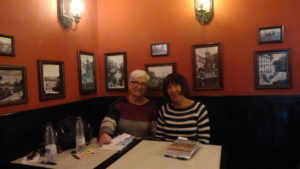
Luz Pichel was born in 1947 in Alén (Lalín, Pontevedra), a tiny village in Galicia. Alén means “beyond” and also means “the beyond”. There she learned to speak in a language that could die but does not want to. Those who speak that language think that it is always others those who speak well.
She is the author of the poetry books El pájaro mudo (1990, City of Santa Cruz de la Palma Award), La marca de los potros (2004, XXIV Latin American poetry prize Juan Ramón Jiménez), Casa pechada (2006, Esquío Poetry Award ), El pájaro mudo y otros poemas (2004), Cativa en su lughar / Casa pechada (2013), Tra (n) shumancias (2015) and Co Co Co Ú (2017).
Part of her work Casa pechada was translated into English and Irish in the anthological book To the winds our sails: Irish writers translate Galician poetry, Salmonpoetry, 2010, ed. Mary O’Donnell & Manuela Palacios.
Neil Anderson translated into English Casa pechada. Several poems appeared in his blog (re) voltas; July, 2014.
Several poems from Casa pechada appeared in the American magazines SALAMANDER, No. 41, year 2015, and PLEIADES, vol. 36, Issue 2, p. 117, year 2016, in English translation by Neil Anderson.
Amparo Arróspide (born in Buenos Aires) is an M.Phil. by the University of Salford. As well as poems, short stories and articles on literature and films in anthologies and international magazines, she has published five poetry collections: Presencia en el Misterio, Mosaicos bajo la hiedra, Alucinación en dos actos y algunos poemas, Pañuelos de usar y tirar and En el oído del viento. The latter is part of a trilogy together with Jacuzzi and Hormigas en diaspora, which are in the course of being published. In 2010 she acted as a co-editor of webzine Poetry Life Times, where many of her translations of Spanish poems have appeared, she has translated authors such as Margaret Atwood, Stevie Smith and James Stephens into Spanish, and others such as Guadalupe Grande, Ángel Minaya, Francisca Aguirre, Carmen Crespo, Javier Díaz Gil into English. She takes part in poetry festivals, recently Centro de Poesía José Hierro (Getafe).
Robin Ouzman Hislop is Editor of Poetry Life and Times his publications include All the Babble of the Souk and Cartoon Molecules collected poems and Key of Mist the recently published Tesserae translations from Spanish poets Guadalupe Grande and Carmen Crespo visit Aquillrelle.com/Author Robin Ouzman Hislop about author. See Robin performing his work Performance (Leeds University) .
Robin Hislop Reads at University of Leeds His Poetry and Translations. Video Performance.
This video recording was made at University of Leeds on October 10th. 2017, it was introduced and presented by Antonio_Martínez_Arboleda Principal Teaching Fellow in Spanish and poet.
The initial image can be enlarged to full screen size. The texts and accompanying images can be easily toggled to place according to requirements.
Below the video also is a link that gives a report and interpretation of the performance by students who attended.
The report is live at http://www.leeds.ac.uk/arts/news/article/5108/2nd_cts_professionalisation_talk_2017-18_international_writers_at_leeds
NO MORE VIEW. A Poem by Bradford Middleton
My old view was an inspiration behind many of the old words
But now that has gone and here I don’t even have a window to look out of
Not one that looks out on the street anyway
Well this means I’ve nothing to gaze out at or
Get annoyed about
The long-lost screaming of hen parties has gone
And no longer do I have to look at hipsters
Out convinced their having their postmodernist fun
But also no view means
I only see beauties now when I’m out on the street
And this place despite the distant
Roar of seagulls presents no view of the sea
Which means it’ll be impossible for me to start any poem
With the words ‘I stare out at sea’
And with that gone I’m not sure what
There will be left to write about.
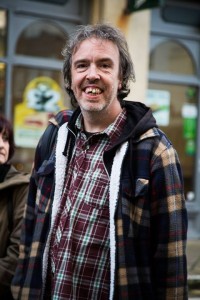
Bradford Middleton was born in London in 1971 but eventually found himself in Brighton in 2007 and began writing. Since then he has over 250 unique publications, including a novel from New Pulp Press and a couple of poetry chapbooks from Crisis Chronicles Press and Holy & Intoxicated Press. His work is dotted all over the internet and in several magazines and journals. He tweets occasionally @beatnikbraduk and is on facebook at bradfordmiddleton1.
www.facebook.com/PoetryLifeTimes
robin@artvilla.com
editor@artvilla.com
Aquillrelle.com/Author Robin Ouzman Hislop & Amazon.com Author Robin Ouzman Hislop
Emily Poems by Darren C Demaree
EMILY AS THE MYSTERY IN THE BASEMENT
The light requires a climbing.
I don’t always want the light.
Most of the time I want Emily.
EMILY AS THE SAME MISTAKE
I am a terrible alcoholic.
I don’t drink anymore,
but I always kiss Emily
& she is still drinking
when she can. I know
the whole of the map
of my sobriety. I set it
on fire by loving Emily
more than I love myself.
EMILY AS WHAT’S BENEATH THE ROOTS
I heard a bell. I named my daughter Belle.
I heard my father-in-law’s shame in the core
of my person, so I named my son after
my father-in-law. Emily, she is pregnant
again, so she is being very careful with what
she’s letting me read these days. My mother
says she owes me a steak dinner for getting
my tenth collection picked up. I think I’ll
change my name to meat. I’ll leave this
next child the pleasure of naming him/herself.
I don’t think I can handle much more
than loving this new world coming my way.
Darren C Demaree poems have appeared, or are scheduled to appear in numerous magazines/journals, including Diode, Meridian, New Letters, Diagram, and the Colorado Review.
He’s the author of six poetry collections, most recently “Many Full Hands Applauding Inelegantly” (2016, 8th House Publishing) and the Managing Editor of the Best of the Net Anthology and Ovenbird Poetry.
Currently living and writing in Columbus, Ohio with wife and children.
https://darrencdemaree.com
Aquillrelle.com/Author Robin Ouzman Hislop & Amazon.com Author Robin Ouzman Hislop
Written in Chalk. A Poem by Judy Moskowitz
My life is written in chalk
no better or worse than yours
a driving rhythm caught me by surprise
taking me to places where
eighth notes swing free
horns cry and singers scat
and i could shed my skin
absorbing every sound and shade
through my pores and tribal wars
i cradle my life holding it close
knowing one day the rain will erase memories
my memorabilia may find its way
on the side of a road
a garage sale or hanging on a strangers wall
but if you call
i will answer
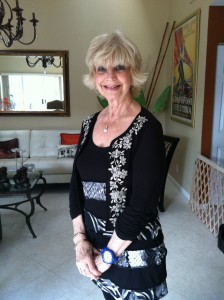
Judy started playing piano at the age of three, and studied at the Julliard School Of Music in New York City, her native city.
She became a jazz pianist and continues to play jazz. Now residing in Florida, she started writing poetry three years ago, and has been published in the Moonlight Dreamers Of The Yellow Haze anthology, Thepoetcommunity, Whispersinthewind, Indiana Voice Journal. Poetry runs deep in her veins along with Music.
Aquillrelle.com/Author Robin Ouzman Hislop & Amazon.com Author Robin Ouzman Hislop

